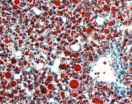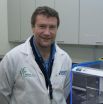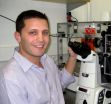(Press-News.org) Researchers have discovered an immune system 'kill switch' that destroys blood stem cells when the body is under severe stress, such as that induced by chemotherapy and systemic infections.
The discovery could have implications for protecting the blood system during chemotherapy or in diseases associated with overwhelming infection, such as sepsis.
The kill switch is triggered when internal immune cell signals that protect the body from infection go haywire. Dr Seth Masters, Dr Motti Gerlic, Dr Benjamin Kile and Dr Ben Croker from the Walter and Eliza Hall Institute led a research project that found blocking these internal signals, in particular a cell receptor called NLRP1, could stop blood stem cells from self-destructing, preventing death after chemotherapy and boosting recovery from infection. The findings were published today in the journal Immunity.
NLRP1 is part of a family of immune receptors that acts as a protective mechanism, instructing immune and blood stem cells to die because it has 'sensed' infection or severe stress-related damage. However this protective mechanism can go too far, Dr Masters said.
"One theory is that when stem cells are infected with a bacteria or virus, they can effectively pass the infection on to all their blood cell offspring, helping to spread the pathogen throughout the body," Dr Masters said. "So the body has evolved to activate this pathway to kill the infected stem cell, reducing the risk of infection. However, in the case of sepsis, or in a cancer patient who contracts an infection, the NLRP1 receptor inappropriately instructs blood stem cells to die, and too many are killed, until the patient can't recover their immune cells, leaving them at much higher risk of death."
Dr Croker said it is the first time that immune receptor-mediated killing of blood stem cells has been suggested to be a critical factor in sepsis, a severe inflammatory disease that kills one person every few minutes worldwide. "Sepsis is the leading cause of death in critically ill patients, leading to shock, organ failure and death," Dr Croker said. "People with sepsis have very low numbers of immune cells in the blood and the ability of the immune system to recover and immune cells to repopulate the body is strongly linked to the patient's chance of survival," he said.
Most research has focused on the 'cytokine storm' theory of sepsis, which says that an excess of inflammatory signals sent out by immune cells cause the severe symptoms in patients. However Dr Croker said all the clinical trials based on this theory have failed. "Our research provides a different view of the disease, one in which the death of blood stem cells leaves the patient unable to repopulate their red and white blood cells, and therefore unable to recover," he said.
Dr Masters said the research could, in the future, lead to treatments for sepsis. "Therapies for sepsis are non-existent at the moment," Dr Masters said "We are really still just treating the infection, in a situation where most people die not from the infection, but from the body's immune response to it."
The research team is involved in testing inhibitors of this pathway to treat severe infections, and have high hopes for its future use. "It is early days, but we are optimistic that this is a pathway that could help to prevent blood cell death and treat severe cases of sepsis, as well as other conditions where blood stem cells are critically depleted, such as during chemotherapy," he said.
###The project was supported by National Health and Medical Research Council of Australia, Australian Research Council, Sylvia and Charles Viertel Foundation, Cancer Council of Victoria, Australian Cancer Research Foundation, Australian Phenomics Network and the Victorian Government.
Immune system kill switch could be target for chemotherapy and infection recovery
2012-12-06
ELSE PRESS RELEASES FROM THIS DATE:
Nobody's perfect
2012-12-06
Researchers at Cambridge and Cardiff have found that, on average, a normal healthy person carries approximately 400 potentially damaging DNA variants and two variants known to be associated directly with disease traits. They showed that one in ten people studied is expected to develop a genetic disease as a consequence of carrying these variants.
It has been known for decades that all people carry some damaging genetic variants that appear to cause little or no ill effect. But this is the first time that researchers have been able to quantify how many such variants each ...
Overestimation of abortion deaths in Mexico hinders maternal mortality reduction efforts
2012-12-06
This press release is available in Spanish and Portuguese.
A collaborative study conducted in Mexico by researchers of the University of West Virginia-Charleston (USA), Universidad Popular Autónoma del Estado de Puebla (Mexico), Universidad de Chile and the Institute of Molecular Epidemiology of the Universidad Católica de la Santísima Concepción (Chile), revealed that IPAS-Mexico overestimated rates of maternal and abortion mortality up to 35% over the last two decades. The research, recently published in the International Journal of Women's Health highlights that Mexico ...
Researchers discover regulator linking exercise to bigger, stronger muscles
2012-12-06
BOSTON - Scientists at Dana-Farber Cancer Institute have isolated a previously unknown protein in muscles that spurs their growth and increased power following resistance exercise. They suggest that artificially raising the protein's levels might someday help prevent muscle loss caused by cancer, prolonged inactivity in hospital patients, and aging.
Mice given extra doses of the protein gained muscle mass and strength, and rodents with cancer were much less affected by cachexia, the loss of muscle that often occurs in cancer patients, according to the report in the Dec. ...
A relationship between cancer genes and the reprogramming gene SOX2 discovered
2012-12-06
A team of researchers from the Spanish National Cancer Research Centre (CNIO), led by Manuel Serrano, from the Tumour Suppression Group, together with scientists from London and Santiago de Compostela, has discovered that the cellular reprogramming gene SOX2, which is involved in several types of cancers, such as lung cancer and pituitary cancer, is directly regulated by the tumor suppressor CDKN1B(p27) gene, which is also associated with these types of cancer.
The same edition of the online version of the journal also includes a study led by Massimo Squatrito, who recently ...
Study IDs gene that turns carbs into fat
2012-12-06
Berkeley — A gene that helps the body convert that big plate of holiday cookies you just polished off into fat could provide a new target for potential treatments for fatty liver disease, diabetes and obesity.
Researchers at the University of California, Berkeley, are unlocking the molecular mechanisms of how our body converts dietary carbohydrates into fat, and as part of that research, they found that a gene with the catchy name BAF60c contributes to fatty liver, or steatosis.
In the study, to be published online Dec. 6 in the journal Molecular Cell, the researchers ...
ACNP: Novel NMDA receptor modulator significantly reduces depression scores within hours
2012-12-06
HOLLYWOOD, FL and EVANSTON, IL, December 6, 2012 -- Naurex Inc., a clinical stage company developing innovative treatments to address unmet needs in psychiatry and neurology, today reported positive results from a Phase IIa clinical trial of its lead antidepressant compound, GLYX-13. GLYX-13 is a novel partial agonist of the NMDA receptor. The Phase Ila results are being presented this week at the 51st Annual Meeting of the American College of Neuropsychopharmacology (ACNP).
The Phase IIa results show that a single administration of GLYX-13 produced statistically significant ...
Research yields understanding of Darwin's 'abominable mystery'
2012-12-06
Research by Indiana University paleobotanist David L. Dilcher and colleagues in Europe sheds new light on what Charles Darwin famously called "an abominable mystery": the apparently sudden appearance and rapid spread of flowering plants in the fossil record.
Writing in the Proceedings of the National Academy of Sciences, the researchers present a scenario in which flowering plants, or angiosperms, evolved and colonized various types of aquatic environments over about 45 million years in the early to middle Cretaceous Period.
Dilcher is professor emeritus at IU Bloomington ...
Environmental chemical blocks cell function
2012-12-06
Bisphenol A, a substance found in many synthetic products, is considered to be harmful, particularly, for fetuses and babies. Researchers from the University of Bonn have now shown in experiments on cells from human and mouse tissue that this environmental chemical blocks calcium channels in cell membranes. Similar effects are elicited by drugs used to treat high blood pressure and cardiac arrhythmia. The results are now presented in the journal "Molecular Pharmacology."
The industrial chemical bisphenol A (BPA) is worldwide extensively utilized for manufacturing polycarbonates ...
New evidence for epigenetic effects of diet on healthy aging
2012-12-06
New research in human volunteers has shown that molecular changes to our genes, known as epigenetic marks, are driven mainly by ageing but are also affected by what we eat.
The study showed that whilst age had the biggest effects on these molecular changes, selenium and vitamin D status reduced the accumulation of epigenetic changes, and high blood folate and obesity increased them. These findings support the idea that healthy ageing is affected by what we eat.
Researchers from the Institute of Food Research led by Dr Nigel Belshaw, working with Prof John Mathers and ...
New understanding can lead to srategies for dealing with neurodegenerative diseases
2012-12-06
Jerusalem Dec. 6, 2012 – A new understanding of what takes place on the cellular level during the development of neurodegenerative diseases, such as Parkinson's, Alzheimer's, ALS and Huntington's diseases, offers promise towards possible new strategies for combating such diseases, say Hebrew University of Jerusalem researchers.
Neurodegenerative conditions result from an impairment of motor function or cognitive function or both. This impairment results from degeneration in the particular area of the brain responsible for those functions.
Although these neurodegenerative ...


